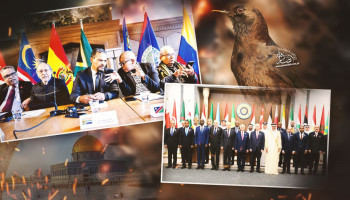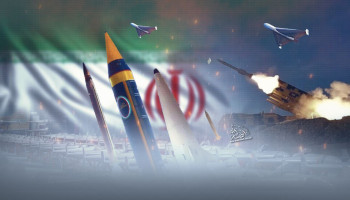Published: Muharram 30, 1447 AH
In a new move revealing the true face of the Zionist settler-colonial project, the Zionist Knesset voted last night in favor of a bill that imposes full “Israeli sovereignty” over the West Bank — a step widely seen as an official declaration of the death of any discussion about the "two-state solution." The vote sparked condemnation from both Hamas and the Palestinian Authority, who rejected it as null, illegitimate, and a direct blow to the chances of peace and the "two-state framework."
Bill Details: Complete Annexation Under a "Legal" Framework
The newly passed law mandates full Zionist civil and legal control over the West Bank and the Jordan Valley, replacing the military law that has governed the territories since 1967. Practically, this means the annexation of settlements and surrounding areas, the expansion of Israeli control, and the open legalization of settlement construction, effectively ending any special legal status of the territory as occupied land.
The law states that “Israel" has the natural, historical, and legal right over all the areas of the Land of "Israel", the historical homeland of the Jewish people.” It calls on the Zionist so called "government" to act soon to implement Zionist sovereignty, law, judiciary, and administrative procedures across all forms of Jewish settlements in the West Bank and Jordan Valley.
Timing and Political Motives
This move comes at a politically complex moment for the far-right Zionist government led by Netanyahu, which depends on the support of religious Zionist and extremist nationalist forces for its survival. Internally, annexation serves to rally the right-wing base and relieve pressures stemming from widespread protests, economic turmoil, and judicial crises — all compounded by nearly two years of military failure in Gaza and its far-reaching security, financial, and social repercussions.
Regionally, the Zionist entity is exploiting the prevailing Arab weakness, apathy, and inaction. With the ongoing killing, siege, and starvation in Gaza failing to elicit any meaningful Arab response, Tel Aviv calculates that reactions to this new move will be equally muted, limited to symbolic statements and formal condemnations that go no further than the ink with which they are written.
Observers also point to a possible connection between the bill and current negotiations, which may result in a ceasefire in Gaza as part of a prisoner exchange deal. The logic is that West Bank annexation could serve as a concession to far-right factions in Netanyahu’s coalition in exchange for allowing the prisoner deal to go through. However, this remains speculative in light of Israel’s continued intransigence on the Gaza file and its clear intentions to forcibly displace the population, either through direct military violence or through starvation, which is increasingly devastating Gaza by the day.
A Continuation of Oslo’s Path and a Blow to International Law
This annexation step does not come as a surprise to those familiar with Zionist policy since the Oslo Accords in 1993. For the past thirty years, the Zionist entity has implemented a strategy of “creating facts on the ground” through settlement expansion and systematic obstruction of any negotiations on final-status issues. Each right-wing government has only accelerated this trajectory: managing the conflict rather than resolving it, while entrenching full control over Palestinian land.
The annexation law violates all principles of international law, from the Fourth Geneva Convention, which prohibits annexation and population transfers by force, to UN Security Council Resolutions 242 and 338, and the core foundations of the peace process itself. Yet the question persists: does international law still carry any weight if the international community continues to respond with nothing more than verbal condemnation and lacks the will for real punitive measures?
Stripping the West Bank of its legal status as occupied territory ends any serious prospect for establishing a sovereign Palestinian state. The territory effectively becomes part of the “Greater Israel” project, institutionalizing apartheid where Palestinians live in isolated enclaves, devoid of sovereignty, mobility, or resources.
A Test for the Global Community and Arab Initiatives
International law, major powers, and the United Nations are all theoretically obligated to respond to this breach. However, recent history suggests that, at best, the world’s response will be limited to condemnations and press releases, with no sanctions or meaningful political consequences. This continued failure by the international system reinforces the Zionist entity’s conviction that “time is on its side” and that the international community cannot impose limits on its expansionist project.
The Arab Peace Initiative, proposed by Saudi Arabia in 2002 as a framework for normalization in exchange for Israel’s withdrawal from occupied territories, is completely undermined by this new law. This is not the first time the initiative has been publicly humiliated, but the annexation bill effectively buries it. It also places recent normalization deals under real scrutiny, portraying them as acts of complicity in Gaza’s destruction and the liquidation of the Palestinian cause.
And what do these normalization deals offer in return? Nothing, in the full sense of the word. The cost is paid by the normalization regimes themselves, through billions in investments into Tel Aviv or arms deals with figures like the criminal Trump. The question remains: are these partnerships anything more than collaboration with the enemy to finalize the erasure of Palestinian rights?
As for the United Nations, the same questions resurface: What value do its resolutions hold if never implemented? What is the point of the Security Council if it cannot enforce its own decisions? The Zionist entity's continued impunity threatens to erode global confidence not just in international law, but in the very legitimacy of the international system — a confidence that, for many, never advanced beyond cautious hope.
Palestinian Options and the Arab Role
In the face of this sweeping annexation, Palestinians have few options left but to reorganize their internal political landscape, unify their ranks, and activate resistance in all its forms, especially given the failure of negotiations and the collapse of all diplomatic slogans. Armed and popular resistance emerges once again as the natural response to a law that enacts the principle: “What was taken by force can only be restored by force.”
This annexation bill is not just another piece of legislation — it is a decisive moment that proves the occupation fears neither international law nor toothless condemnations. It exposes the lie of “just peace” for what it always was: a cover for the erosion of Palestinian rights. It is a moment of reckoning for anyone who ever bet on the path of negotiations and rejected the resistance option, believing the entity would one day grant them a sovereign state.
The Zionist entity has torn apart the foundation of that belief with a single decision in the Knesset. For those who once deemed the peace path “realistic,” the truth is now unavoidable: it was a delayed surrender that handed over the land and holy sites to the occupying enemy under the guise of recognition and normalization. So what now, as Israel destroys their vision with the stroke of a pen?
Unless these advocates of diplomacy realize that resistance in all its forms is now the only viable path to safeguard what remains of land and dignity, they themselves will complete what the enemy could not accomplish by force.







